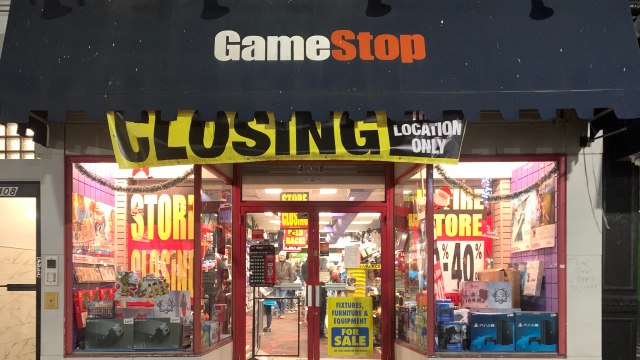
You may have heard a lot of confusing terms like ‘short selling a stock’ and ‘short squeeze’ floating about in the news following the share price surge in a video game business called GameStop. Here to hopefully clear things up a bit is Wealth Within’s Chief Analyst Dale Gillham.
What is shorting a stock?
Basically, you’re borrowing the shares of a company you expect to fall in value. The idea is to sell the borrowed shares straight away, then buy them back later at a cheaper price after the value has fallen, before returning them to whoever you borrowed them from (usually a stockbroker).
“It’s like selling a house you don’t own to buy it back later,” Mr Gillham told Canstar.
With a successful short, the short-seller pockets the difference between the selling price (high) and the buying price (low), minus any costs for borrowing the shares in the first place.
But if the opposite happens, and the value goes up (as we’ll explain below happened with GameStop’s rally), the short-sellers (often hedge fund managers and other big-time investors) could lose money.
Mr Gillham said most stockbrokers tended to place limits on how big a short-seller’s losses can get before requiring them to either contribute more money or “close out” their investment – which means to bring it to an end by buying the shares back and returning them to the stockbroker.
How does GameStop tie in? A brief summary:
Texas-based video game business GameStop, which some Australians may know as the parent company of EB Games, has recently seen its share price soar over 8,000% compared to just a few months ago.
The stock’s price on the New York Stock Exchange increased from around $US17 at the start of January and around $US4 in mid-July 2020, to just under $US470 on Thursday, 27 January, with a large spike in the past week.
But why?
It’s a lot to do with a Reddit forum called Wall Street Bets, whose two million-plus members wanted to put short-selling hedge funds and big-time investors in a bind. Many of these so-called “short sellers” had last year bet that the bricks-and-mortar business’ share price would fall lower in the digital age, as fewer people buy video games on physical discs.
The Reddit users and small-scale retail investors who heard about the buzz rallied behind GameStop and managed to manipulate the stock market, drastically inflating the company’s share price. The more people bought the stock, the more the price went up. This forced short-selling traders to buy more to stem their losses, driving the share price up even higher.
Other companies like Nokia and Blackberry have also seen stock prices rise as a spill-over effect from the social media-driven hype around GameStop. Redditors have even turned to ramping up the value of meme-inspired cryptocurrency Dogecoin.
In response to the massive surge in activity, some trading platforms have placed restrictions on users purchasing the shares of companies like GameStop due to concerns around volatility. This move has drawn criticism from some investors and politicians who say it goes against the idea of an open and free market.
Since the trading restrictions came into effect, GameStop’s shares fell from their short-lived peak but remained high at $US325 per share when trading in the US closed on Friday 29 January.
And the story is still developing.
Is short selling a stock a good idea?
Mr Gillham said he doesn’t necessarily agree with short-selling because “you’re not really investing”.
“The market’s about creating wealth and investing for the medium to longer term. It’s about buying something that grows in value,” he said.
“Whereas short selling and hedging is just speculation and taking money out of the market, and generally retail investors lose because of it.”
Another factor to consider is that with short-selling, there is theoretically no limit to how much you can lose. This is because the price of a stock could rise to any amount, whereas with more conventional investing – where you hope the value of the stocks you own will go up – the lowest it can fall is to $0.
To use the GameStop example, a hypothetical short-seller who paid $US1,700 for 100 shares in the company at $US17 each at the start of January and had to buy them back at $US347 to return them to their stockbroker would have made a loss of $US330 per share, or a total loss of $US33,000 plus borrowing fees and the initial $US1,700 investment.
However, as mentioned above, in practice stockbrokers may set limits on how much they will allow shorters to lose before forcing them to return the borrowed shares.
What is a ‘short squeeze’?
“It’s like watching lifesavers play that flag race where they’re all trying to grab that one flag in the sand – everybody’s trying to buy the stock to get out of their positions. And that causes the price to snowball higher,” Mr Gillham explained.
He used the example of Tesla, which he said had been one of the most heavily-shorted stocks on the US market until around the middle of 2020, but its value kept rising because traders in forums and on trading apps like Robinhood kept pushing it up.
“In a four-hour period, they pushed Tesla up by a phenomenal amount where something like 40 million trades went through. That created what they call a short squeeze,” he said.
He explained that if a hedge fund has sold all its stock in a particular company (say, Tesla in this scenario) hoping the company’s share price will fall away, then the hedge fund knows it will lose money if the share price rises too much. If the stock price starts going up and multiple hedge funds in this situation try to fight to get out of their position to minimise risk, they would all be trying to buy the same stock.
“So, that’s a short squeeze because they’re all scrambling there,” he said.
This is exactly what the ‘Redditors’ and ‘Robinhood investors’ have been trying to do to hedge fund managers and big-time investors with GameStop, with part of the rationale being to ‘help out the little man’ by supporting a company many Americans have fond memories of.
What are the implications of all this for the Australian market?
Mr Gillham thinks attention from Australian regulators such as the Australian Competition and Consumer Commission (ACCC) and Australian Securities and Investments Commission (ASIC) is inevitable because the artificial inflation of stocks creates volatility that he says is not good for the share market.
He says he had already seen the artificial inflation of stocks happening in Australia, usually with social-media driven speculation around certain mining stocks, a2 Milk and even some buy now pay later stocks like Afterpay.
“There’ll be more regulation here because if you’ve got people on chat forums giving recommendations, that’s against Australian financial services law,” Mr Gillham said.
“The regulators may start getting into these chat forums and demanding from the chat forum providers saying ‘we need these people’ and if they don’t have a financial services licence we will litigate against them because they’re pushing and artificially ramping up a stock and manipulating stock prices, which is all illegal in Australia.”
RMIT University Senior Lecturer in Finance Angel Zhong said ASIC was concerned about social trading and has warned retail investors to be cautious about ‘copy trading’ offered by low-cost trading platforms.
She explained copy trading is a form of social trading, and similar to the way Reddit traders have bought up GameStop this time.
“The GameStop saga has also alarmed the short-sellers in Australia who may face a battle from retail investors,” she said.
“There could be a price surge in the most shorted Australian stocks such as WebJet, a2 Milk, and Flight Centre.”
What not to do when investing
Mr Gillham laid out three key things not to do when investing in shares:
1. Invest in something you don’t understand
Warren Buffett would agree to never invest in something you don’t understand. This avoids exposing yourself to the risks of an industry or business that may be far more complicated or volatile than it appears to the untrained eye.
2. Follow the herd
“You tend to make far more money long term by carving your own journey, not following the herd,” Mr Gillham said.
He said the fear of missing out (FOMO) often saw a lot of people jump in upon seeing a stock such as GameStop or a cryptocurrency like Bitcoin ramping up in price, which can result in them losing money.
“The early ones will get it and they’ll ramp and make some money and the ones that are a little bit slower will get cranked,” he said.
3. Buy quantity over quality
“Always buy quality,” Mr Gillham urged. “It’s not how many stocks you own, it’s the quality of the stocks you own.”
He said you’d generally be better off in the long term buying a more expensive and quality blue-chip stock than a lot of cheap stocks out of speculation.
Want to learn more about investing? Visit Canstar’s Investor Hub
This story has been updated. Originally published on Friday, 29 January 2021.
This article was reviewed by our Sub Editor Tom Letts before it was published, as part of our fact-checking process.
Follow Canstar on Facebook and Twitter for regular financial updates.
If you’re comparing online share trading companies, the comparison table below displays some of the companies available on Canstar’s database with links to providers’ websites. The information displayed is based on an average of six trades per month. Please note the table is sorted by Star Rating (highest to lowest), followed by provider name (alphabetical). Use Canstar’s Online Share Trading comparison selector to view a wider range of online share trading companies.
Thanks for visiting Canstar, Australia’s biggest financial comparison site*
→ Looking to find a better deal? Compare car insurance, car loans, health insurance, credit cards, life insurance and home loans with Canstar. You can also check your credit score for free.







Share this article